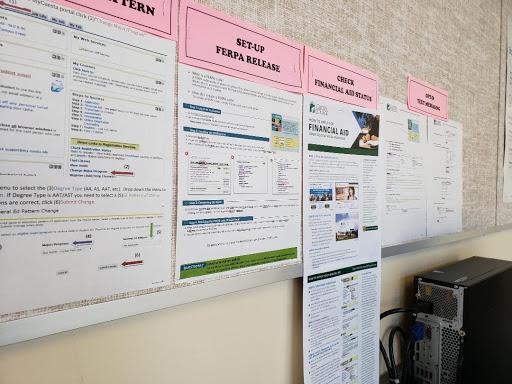On Feb. 20, current Cuesta College students received an email from the Cuesta College Financial Aid Department regarding a seemingly major change in federal financial aid policy called the Course Program of Study (CPOS).Â
According to the Financial Aid Department, the CPOS change means only courses that count directly towards a student’s major will be considered when calculating federal financial aid eligibility. With a large policy change like this, there’s likely to be some worry from students about what it means for them and their financial aid eligibility.
One of the biggest concerns surrounding the CPOS policy change is the misconception that general education courses are no longer covered by federal financial aid. Electives are what’s not covered, and while a lot of general education courses are counted as major pathway material, there are some that are technically considered electives and aren’t included in federal financial aid disbursement.Â
Some major-specific courses double as general education and major coursework, so extra course credits are required to reach Cuesta College’s graduation or transfer requirements. Meaning that classes that would have otherwise been general education are now counted as electives, and are no longer covered.Â
Essentially, while general education classes are still covered, they are just limited in new ways. While this may deter some students from branching out and taking courses they otherwise would have, Cuesta College Academic Counselor Heidi Webber, who has worked at Cuesta College for approximately seven years and spent one year working full time in the financial aid office, believes this change has the potential to help keep students on track in their studies and to maximize their financial aid eligibility.  Â
“I think the most important thing is that students are adding courses that will meet their goal and planning accordingly if they want to take other courses outside their major,†Webber said.Â
Previously, a number of students tended to overuse their available federal financial aid (such as the Pell Grant) early on in their academic career and on unnecessary courses, meaning they had less to draw from later. This is a big reason for CPOS; while CPOS does help reduce federal spending, it also helps get students through Cuesta College that much faster.Â
Additionally, many Cuesta College students will be relatively unaffected by this change thanks to the Cuesta Promise. Any student utilizing the Cuesta Promise will be unaffected by these policy changes. Once their time with the Cuesta Promise runs out, this change will affect them.
“I do think it could affect me since this is my last semester using the Promise,†said Avery Sowell, a Cuesta College student. “I am currently utilizing the Federal Application for Federal Student Aid (FAFSA), so it’s a little worrying.â€
Sowell is currently not declared in any major, so the Course Program of Study change will have a greater impact on him and other undeclared students. Without a declared major and associated coursework, federal financial aid will no longer assist these students at all.Â
With the Course Program of Study change getting closer to being enacted, there are a few things that can help students further understand the change if they have concerns.Â
First and foremost, be sure to meet with a Financial Aid Office official on campus to discuss specific circumstances and the effects of CPOS. Everyone’s circumstances are different, as is everyone’s eligibility.
Second, meet with an academic counselor to find pathway flexibility and plan accordingly. A solid plan can allow students to maximize the federal financial aid they’re able to receive. This is especially important for students who are hoping to transfer and whose majors aren’t technically available at Cuesta College; they need to plan extra carefully and stay close to their transfer schools requirements.Â















